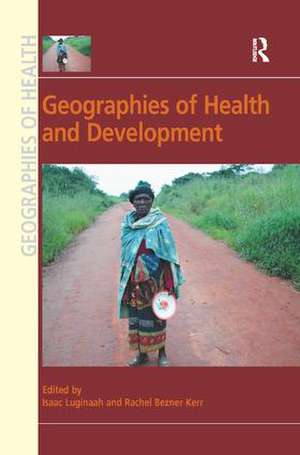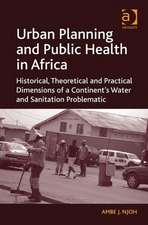Geographies of Health and Development: Geographies of Health Series
Editat de Rachel Bezner Kerr, Isaac Luginaahen Limba Engleză Paperback – 6 feb 2018
| Toate formatele și edițiile | Preț | Express |
|---|---|---|
| Paperback (1) | 436.14 lei 43-57 zile | |
| Taylor & Francis – 6 feb 2018 | 436.14 lei 43-57 zile | |
| Hardback (1) | 1010.53 lei 43-57 zile | |
| Taylor & Francis – 28 feb 2015 | 1010.53 lei 43-57 zile |
Din seria Geographies of Health Series
-
 Preț: 388.30 lei
Preț: 388.30 lei - 24%
 Preț: 322.05 lei
Preț: 322.05 lei - 18%
 Preț: 1118.99 lei
Preț: 1118.99 lei -
 Preț: 489.26 lei
Preț: 489.26 lei -
 Preț: 394.37 lei
Preț: 394.37 lei -
 Preț: 436.18 lei
Preț: 436.18 lei - 18%
 Preț: 260.33 lei
Preț: 260.33 lei -
 Preț: 387.75 lei
Preț: 387.75 lei -
 Preț: 389.38 lei
Preț: 389.38 lei -
 Preț: 383.83 lei
Preț: 383.83 lei -
 Preț: 382.86 lei
Preț: 382.86 lei - 17%
 Preț: 259.98 lei
Preț: 259.98 lei - 17%
 Preț: 259.98 lei
Preț: 259.98 lei -
 Preț: 383.17 lei
Preț: 383.17 lei -
 Preț: 334.09 lei
Preț: 334.09 lei - 18%
 Preț: 1001.21 lei
Preț: 1001.21 lei -
 Preț: 389.66 lei
Preț: 389.66 lei - 18%
 Preț: 1005.73 lei
Preț: 1005.73 lei - 5%
 Preț: 1157.24 lei
Preț: 1157.24 lei
Preț: 436.14 lei
Nou
Puncte Express: 654
Preț estimativ în valută:
83.46€ • 87.35$ • 69.46£
83.46€ • 87.35$ • 69.46£
Carte tipărită la comandă
Livrare economică 31 martie-14 aprilie
Preluare comenzi: 021 569.72.76
Specificații
ISBN-13: 9781138546950
ISBN-10: 113854695X
Pagini: 332
Dimensiuni: 156 x 234 x 18 mm
Greutate: 0.45 kg
Ediția:1
Editura: Taylor & Francis
Colecția Routledge
Seria Geographies of Health Series
Locul publicării:Oxford, United Kingdom
ISBN-10: 113854695X
Pagini: 332
Dimensiuni: 156 x 234 x 18 mm
Greutate: 0.45 kg
Ediția:1
Editura: Taylor & Francis
Colecția Routledge
Seria Geographies of Health Series
Locul publicării:Oxford, United Kingdom
Cuprins
Contents: Preface; Introduction, Isaac Luginaah, Rachel Bezner Kerr and Jenna Dixon. Part I Disparities in Health Outcomes and the Challenges to Health Equity: Malaria risk profiles, treatment seeking practices and disease intervention efforts in poor communities: a case study in Sierra Leone, Florence M. Margai and Jacob B. Minah; The geography of maternal mortality in Nigeria, Joseph R. Oppong and Jane Ebeniro; Sex [work] and [structural] violence: a study of commercial sex workers in Budhwar Peth, Pune, India, Jacqueline P. Hellen and Vandana Wadhwa; Aboriginal health and development: two steps forward and one step back?, Kathi Wilson, Mark. W. Rosenberg and Ashley Ning. Part II Health Access and Utilisation in Developing Countries: The place of 'health' in social health insurance in developing countries: a study in Ghana's Upper West Region, Jenna Dixon and Paul Mkandawire; From effective cure to affective care: access barriers and entitlements to health care among urban poor in Chennai, India, Christina Ergler, Patrick Sakdapolrak, Hans-George Bohle and Robin Kearns; Human resources for health: challenges facing Sub-Saharan Africa, Gavin George, Candice Reardon and Tim Quinlan; Wanting to care: a comparison of the ethics of health worker education in Cuba and the Philippines, Robert Huish. Part III Environmental Influences on Health and Development: Living in the same place, eating in a different space: food security and dietary diversity of youth living in rural northern Malawi, Lauren Classen, Rachel Bezner Kerr and Lizzie Shumba; Resource depletion, peak oil, and public health: planning for a slow growth future, Michael Pennock, Blake Poland and Trevor Hancock; The water-health nexus, Corinne J. Schuster-Wallace, Susan J. Elliott and Elijah Bisung; Groundwater arsenic contamination and its health and social impacts in rural Bangladesh, Bimal Kanti Paul. Part IV Globalisation and Urbanisation: Global Policy Consequences on Local Health Problems: Tubercu
Notă biografică
Isaac Luginaah is at The University of Western Ontario, Canada and Rachel Bezner Kerr, Cornell University, USA.
Recenzii
(…) "it does offer a smorgasbord of locations, socio-cultural contexts and health issues that speak to the rich interplay between health, development, space and place. It is, overall, a stimulating collection of studies, with the geographic framing providing a new prism for analysis and understanding." - Assoc. Prof. Peter Hill Global Health Systems, School of Public Health, The University of Queensland
’In addition to being a valuable resource for both graduate and undergraduate students in global health, this book will be a great resource for trans-disciplinary researchers and professionals who want to understand the inter-linkages between health geography and development, broadly conceived. It offers a fresh and interdisciplinary perspective on the complex and dialectic relationship between health and development through its interesting use of locally derived case studies.’ Ezekiel Kalipeni, University of Illinois at Urbana-Champaign, USA ’Globalization may lead to adaptation development initiatives despite the potential of widening health disparities. Isaac Luginaah and Rachel Bezner Kerr’s timely book examines the spatially varying contexts of poor health and inequitable development initiatives through case studies from around the world and the lens of health geographers. Future directions offer a paradigm shift in global to local development for academics and professionals engaged in research and practice.’ Sue C. Grady, Michigan State University, USA 'This exciting and important book illuminates the close interconnections between global and local health inequalities and economic development processes in our increasingly interdependent and globalized world. Grounded case studies from across the globe reveal how people's health and well-being are bound up with a shifting matrix of place-based vulnerabilities that reflect broader political, socio-economic and environmental transformations. The book's strong multidisciplinary perspective and attention to public health policy implications and issues of equity and social justice make it essential reading for researchers and policy-makers in global public health, health geography, and development studies.' Sara McLafferty, University of Illinois at Urbana-Champaign, USA 'This book provides an overview of health geography, the sub-field of human geography that applies to medicine and health. The cases a
’In addition to being a valuable resource for both graduate and undergraduate students in global health, this book will be a great resource for trans-disciplinary researchers and professionals who want to understand the inter-linkages between health geography and development, broadly conceived. It offers a fresh and interdisciplinary perspective on the complex and dialectic relationship between health and development through its interesting use of locally derived case studies.’ Ezekiel Kalipeni, University of Illinois at Urbana-Champaign, USA ’Globalization may lead to adaptation development initiatives despite the potential of widening health disparities. Isaac Luginaah and Rachel Bezner Kerr’s timely book examines the spatially varying contexts of poor health and inequitable development initiatives through case studies from around the world and the lens of health geographers. Future directions offer a paradigm shift in global to local development for academics and professionals engaged in research and practice.’ Sue C. Grady, Michigan State University, USA 'This exciting and important book illuminates the close interconnections between global and local health inequalities and economic development processes in our increasingly interdependent and globalized world. Grounded case studies from across the globe reveal how people's health and well-being are bound up with a shifting matrix of place-based vulnerabilities that reflect broader political, socio-economic and environmental transformations. The book's strong multidisciplinary perspective and attention to public health policy implications and issues of equity and social justice make it essential reading for researchers and policy-makers in global public health, health geography, and development studies.' Sara McLafferty, University of Illinois at Urbana-Champaign, USA 'This book provides an overview of health geography, the sub-field of human geography that applies to medicine and health. The cases a
Descriere
This book begins by exploring some of the circumstances surrounding the distinctive health inequities currently facing many developing countries, including malaria, maternal mortality and HIV/AIDS. This is followed by a discussion of how matters of physical access and human resource issues and, perhaps most importantly, the challenges of financing, together shape the access and utilization of health care. Examining how the environment interacts to influence the health of the people that live there, the next section includes discussion around challenges of food (in)security, and the importance of clean and uncontaminated water for health. Finally, the book explores the influence of globalization on health, specifically within the urban environment, against the backdrop of global health policy.




























